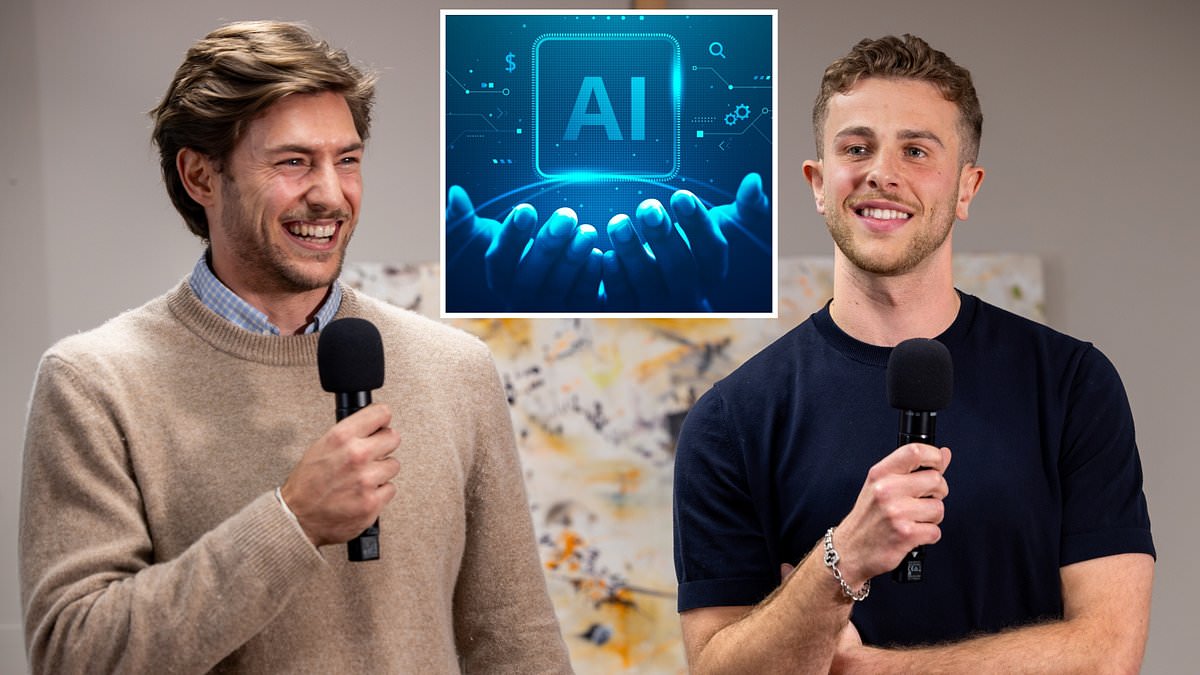How you can avoid AI stealing your job – by getting a job working in AI! Industry experts reveal everything you need to know about the tech careers of the future
By Editor,Jamie Boys
Copyright dailymail

For decades, a good degree from a respected university was the ticket to a graduate job and a decent salary.
Employers would vie for the brightest and best, and graduates would find that – although expensive – their degrees would ultimately pay off because they could command higher wages.
But not any more, it seems. Hundreds of thousands of graduates are leaving university and entering the most difficult jobs market in years – and with an even gloomier outlook on the horizon.
Scores are applying for every job, trainee schemes and apprenticeships are drying up, and some graduates are making hundreds of applications without a single success.
James Reed, chief executive of recruiter Reed, said this month that the number of graduate job adverts on its site has plummeted from 180,000 three or four years ago to just 55,000 today. So worrying is the outlook that he suggested families should encourage their children to look into manual jobs instead.
Behind this bleak jobs market is a toxic storm of factors. Anaemic growth in the economy is one. Employers are hesitant to take on new staff while they’re not sure what’s ahead.
Labour’s increase in the National Insurance paid by employers and to the minimum wage has also hit the jobs market as both measures raise the cost of taking on new employees.
The number of vacancies in the UK fell by another 10,000 between June and August to 728,000 – the 38th consecutive quarterly drop.
But perhaps most insidious is the growth of AI in the workplace, which is seeing many of the roles typically performed by graduates taken over by this new technology.
Until very recently, tasks such as writing reports, researching and admin would be assigned to workers on the first rung of the career ladder.
Now so-called machine learning Large Language Models, such as ChatGPT, can perform these tasks – and are often cheaper and faster than the graduates they are replacing.
Users of these tools can simply type in commands such as ‘write me a presentation based on the following data and spreadsheets’ or ‘read these five reports and write a 1,000-word precis’ and the tasks are complete within minutes or even seconds.
However, in this dark landscape there is a ray of light.
While nine million jobs could be lost globally due to AI in the next five years, according to the World Economic Forum, the same report also predicts that 11 million jobs could be created by AI.
Unlike previous jobs in new technology, they will not typically require specialist knowledge or computer science training.
In fact, the skills required are those learned by graduates from both arts and science degrees.
Many graduates are fighting back against AI stealing jobs, by getting a job in AI themselves. Jake Blaisdell, 25, is one of them. He co-founded an AI start-up with no formal training in computer science, having studied international business at the University of Edinburgh.
He says almost anyone can now develop an app to show prospective investors who might be able to kickstart a business.
Previously you would have needed to employ an app designer or a coder. Now you can get your app to do whatever you wish by inputting prompts in simple English into an AI tool such as Amazon Bedrock, Claude or ChatGPT.
For example, if you wanted your app to set an alarm at 9am, instead of inputting lines of code, you could write a prompt into the AI tool saying, ‘write a line of code to make an alarm go off at 9am every day’ and it would handle it. This means anyone could build an app or website without specialist help.
Jake and his co-founder Conrad Kissling spent six weeks using AI tools to design the functionality of their phone app, Remy. He says that was enough to create an early version to show potential investors – and they managed to raise £345,000 last year as a result.
The app, Remy, is designed to help families cut down food waste by cataloguing what is in their fridges and cupboards, then alerting them when it is about to go off and suggesting recipes to cook it.
It’s claimed it can save a family of four £2,000 a year in food waste.
Users take a picture of the contents of their fridge and cupboards and upload them into the app. It then uses AI to trawl through a huge bank of images to identify what the user has and matches them up with a database of typical best-before dates to get an idea of when each item will expire.
The app can connect to your online shopping accounts so that it can order it automatically.
‘I didn’t need to know how to code to build the app at all,’ says Jake. ‘By playing around with AI tools, we were able to make enough progress to show investors our vision.’
He says advancements in AI mean this could now be done in days, if not hours.
Another tech founder, Robert van Biljon, 25, started an AI-powered medical assistant that he hopes to one day sell to the NHS.
His Nora AI app uses smartphones to record and transcribe doctors’ appointments and summarise the key points. The tool has strong security built in to protect patient data.
The aim is save time for doctors and allow patients to have ready-made notes, so they don’t forget important information. Doctors have already used it for taking notes in 31,000 appointments.
‘Initially we thought we were going to hire a software engineer to create Nora, but it didn’t work out,’ he says. ‘I think that was such a blessing in the end because we just had to learn to do it ourselves.
‘AI does make mistakes, though. You have to check its work. It’s there to speed things up, but it’s not there yet to fully do things.
‘Now anyone with a great idea can start a company because of AI. I would definitely encourage young people to get into it. Why not just try it? There are so many helpful AI platforms to get your idea off the ground. It’s incredible.
‘You’re not always going to win but it’s not just about how much money you have any more when starting a business.’
But starting a company isn’t for everyone. The risks are high and you are unlikely to get paid until someone invests in your idea or it starts to earn a profit from customers. Finding a job in an existing AI company is another option.
Over the past decade, job postings requiring AI-related skills have grown 3.6 times faster than any others, according to consultancy giant PwC.
Sam Ajami, 25, works as a senior account manager at tech firm Symbe, which uses AI to allow clients to develop business pitches.
You can dump a huge quantity of uncurated information into the AI tool, such as sales figures and financial statements, and ask it to pick out the key information and present it in an engaging format that a sales person could bring into a meeting with potential clients.
Sam says his degree in medical biochemistry was useful, but not vital for securing his job. He had taught himself coding but quickly found that using ChatGPT to code, with the help of resources such as YouTube, allowed him to feel confident to work in the industry.
He says: ‘They call it vibe coding now [using natural language rather than computer code], You don’t need a degree to get to grips with tech.’
With bonuses, he makes £70,000 to £80,000 a year – more than twice the £32,292 national average for people his age, according to the Office for National Statistics.
Sam has been saving since he was 16, and feels he could have £100,000 to put towards a house in London in two years’ time thanks to his lucrative job.
Josh Beckwith, 41, has been in the technology sector since the end of the dotcom bubble, but has shifted with the times into AI. ‘While not everyone works directly in the AI industry, it is certainly true that every industry is now working with AI,’ he says.
‘There is rapid growth and it’s exciting to be a part of it.’
Josh studied biology and conservation at Manchester Metropolitan University and is now a vice president at Sojern, where he leads global sales.
Sojern is an AI marketing platform that predicts behaviour to help target adverts for hotels and airlines to the people who are most likely to travel. It made a profit of £1.15 million in the UK in 2023, according to records filed at Companies House.
Jack Pattni, 25, a customer success manager at AI firm Attentive had no experience with tech or AI after university, where he studied industrial economics.
‘[The job] needed the experience of managing accounts and looking after clients, but nothing specific to AI,’ says Jack. He describes his degree as ‘a load of tosh’ but feels he needed a respectable education to get to the position he is in.
He, too, makes significantly more than the national average with a salary of £55,000, with bonuses. This allows him to save for a house while also taking four to five holidays abroad every year.
Attentive uses AI to send personalised text messages and emails to advertise products, with clothing giant Urban Outfitters a major client.
Its AI sorts through the data a company holds about its customers and their previous purchases to identify trends and customer types. It then uses this to design personalised advertising.
Jack says: ‘For example, a university student may be more likely to buy cheap items, and they are more likely to buy them at night. So we can send an advert at 9pm, for on-sale items.
‘Whereas an older woman typically shops earlier in the day, and buys more expensive items, so the advert would come earlier for expensive women’s clothing.’
For those looking to cash in on the lucrative AI jobs market, Robert says: ‘There isn’t a need to know coding in depth any more, even if you want to start a tech firm. I would say the biggest thing is just using AI tools daily.
‘We’re hiring now, and if we speak to someone and they haven’t used ChatGPT that’s immediately a no as it can quadruple your productivity.’
Beckwith, of Sojern, says he needs computer scientists for some technical roles, but most jobs just require an ability to master AI prompts – the ability to ask the right questions to get the best out of it.
‘You don’t need to be a data scientist or AI engineer any more to work in AI. The industry needs people who understand human behaviour, ethics, design and storytelling too.
‘The best advice? Stay curious. Learn how AI is being used in the real world, not just in theory.
‘I’m a firm believer in the sentiment that AI won’t steal your job, but someone who knows how to use it better than you might. That’s the real shift we’re seeing.
‘The best way to future-proof your career isn’t to fear AI, it’s to get familiar with it, as it’s not going away anytime soon.’



